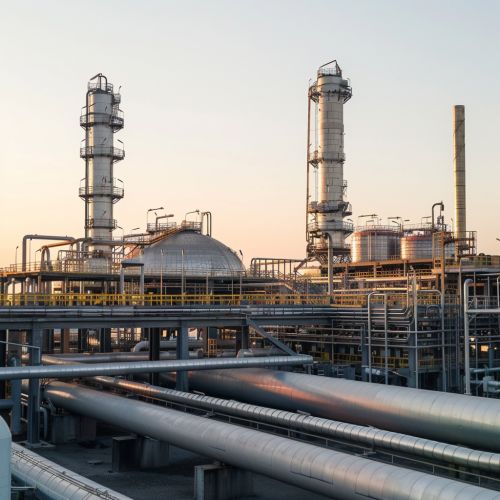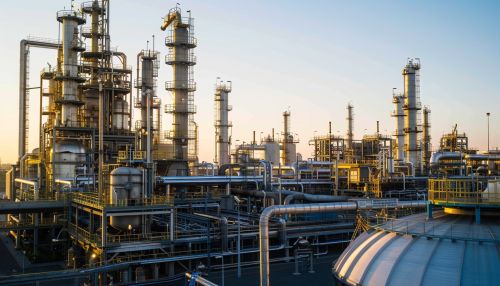Chemical Processing Industry: Difference between revisions
(Created page with "== Introduction == The chemical processing industry is a sector that encompasses the transformation of raw materials into valuable chemical products through chemical reactions, physical processes, and biological methods. This industry plays a crucial role in the global economy, contributing to the production of a wide range of products, including pharmaceuticals, petrochemicals, agrochemicals, polymers, and specialty chemicals. The chemical processing industry is charac...") |
No edit summary |
||
| Line 113: | Line 113: | ||
The chemical processing industry is a dynamic and diverse sector that plays a vital role in the global economy. It encompasses a wide range of processes, technologies, and products that are essential to various industries and everyday life. As the industry continues to evolve, it faces challenges and opportunities related to environmental sustainability, safety, and technological innovation. By embracing green chemistry, digitalization, and biotechnology, the chemical processing industry can continue to thrive and contribute to a sustainable future. | The chemical processing industry is a dynamic and diverse sector that plays a vital role in the global economy. It encompasses a wide range of processes, technologies, and products that are essential to various industries and everyday life. As the industry continues to evolve, it faces challenges and opportunities related to environmental sustainability, safety, and technological innovation. By embracing green chemistry, digitalization, and biotechnology, the chemical processing industry can continue to thrive and contribute to a sustainable future. | ||
[[Image:Detail-91773.jpg|thumb|center|An industrial chemical plant with large reactors, storage tanks, and pipelines under a clear sky.|class=only_on_mobile]] | |||
[[Image:Detail-91774.jpg|thumb|center|An industrial chemical plant with large reactors, storage tanks, and pipelines under a clear sky.|class=only_on_desktop]] | |||
== See Also == | == See Also == | ||
Latest revision as of 17:21, 19 June 2024
Introduction
The chemical processing industry is a sector that encompasses the transformation of raw materials into valuable chemical products through chemical reactions, physical processes, and biological methods. This industry plays a crucial role in the global economy, contributing to the production of a wide range of products, including pharmaceuticals, petrochemicals, agrochemicals, polymers, and specialty chemicals. The chemical processing industry is characterized by its complexity, diversity, and the integration of advanced technologies and processes.
Historical Development
The origins of the chemical processing industry can be traced back to ancient civilizations, where basic chemical processes such as fermentation, metallurgy, and dyeing were practiced. However, the modern chemical industry began to take shape during the Industrial Revolution in the 18th and 19th centuries. The discovery of new chemical reactions, the development of industrial-scale production methods, and the establishment of chemical manufacturing companies marked the beginning of this transformative era.
The 20th century witnessed significant advancements in chemical engineering, catalysis, and process optimization, leading to the large-scale production of chemicals. The development of the Haber-Bosch process for ammonia synthesis, the introduction of petrochemical processes, and the rise of the pharmaceutical industry are notable milestones in the history of the chemical processing industry.
Key Sectors and Products
The chemical processing industry is divided into several key sectors, each specializing in the production of specific types of chemicals and products. These sectors include:
Petrochemicals
Petrochemicals are chemicals derived from petroleum and natural gas. They serve as the building blocks for a wide range of products, including plastics, synthetic fibers, rubbers, and solvents. Major petrochemicals include ethylene, propylene, benzene, toluene, and xylene. The production of petrochemicals involves processes such as cracking, reforming, and polymerization.
Pharmaceuticals
The pharmaceutical sector focuses on the development and production of drugs and medications. This sector involves complex chemical synthesis, fermentation, and biotechnological processes to produce active pharmaceutical ingredients (APIs) and finished dosage forms. The pharmaceutical industry is highly regulated to ensure the safety, efficacy, and quality of drugs.
Agrochemicals
Agrochemicals include fertilizers, pesticides, herbicides, and fungicides used in agriculture to enhance crop yield and protect plants from pests and diseases. The production of agrochemicals involves chemical synthesis, formulation, and packaging. Key agrochemicals include ammonium nitrate, urea, glyphosate, and atrazine.
Polymers and Plastics
Polymers and plastics are essential materials used in various industries, including packaging, construction, automotive, and electronics. The production of polymers involves polymerization processes, where monomers are chemically bonded to form long-chain molecules. Common polymers include polyethylene, polypropylene, polyvinyl chloride (PVC), and polystyrene.
Specialty Chemicals
Specialty chemicals are high-value chemicals produced in smaller quantities for specific applications. These include adhesives, sealants, coatings, dyes, pigments, and surfactants. Specialty chemicals are often customized to meet the unique requirements of different industries, such as automotive, aerospace, and consumer goods.
Chemical Processing Technologies
The chemical processing industry employs a wide range of technologies and processes to convert raw materials into valuable products. These technologies can be broadly categorized into chemical, physical, and biological processes.
Chemical Processes
Chemical processes involve chemical reactions that transform raw materials into desired products. Key chemical processes include:
- **Catalysis:** The use of catalysts to accelerate chemical reactions and improve efficiency. Catalysts are substances that increase the rate of reaction without being consumed in the process.
- **Distillation:** A separation process that relies on differences in boiling points to separate components of a mixture. Distillation is commonly used in the production of petrochemicals and alcoholic beverages.
- **Hydrolysis:** A reaction involving the breaking of chemical bonds through the addition of water. Hydrolysis is used in the production of soaps, detergents, and biofuels.
Physical Processes
Physical processes involve the physical transformation of materials without altering their chemical composition. Key physical processes include:
- **Filtration:** The separation of solids from liquids or gases using a filter medium. Filtration is used in water treatment, air purification, and the production of pharmaceuticals.
- **Crystallization:** The formation of solid crystals from a solution or melt. Crystallization is used in the production of high-purity chemicals, pharmaceuticals, and food additives.
- **Evaporation:** The removal of solvent from a solution by heating. Evaporation is used in the concentration of solutions, desalination, and the production of dried products.
Biological Processes
Biological processes involve the use of living organisms or enzymes to carry out chemical transformations. Key biological processes include:
- **Fermentation:** The conversion of sugars into alcohol, acids, or gases by microorganisms. Fermentation is used in the production of alcoholic beverages, biofuels, and pharmaceuticals.
- **Biocatalysis:** The use of enzymes to catalyze chemical reactions. Biocatalysis is used in the synthesis of complex molecules, including pharmaceuticals and specialty chemicals.
- **Bioremediation:** The use of microorganisms to degrade environmental pollutants. Bioremediation is used in the cleanup of contaminated soil and water.
Environmental and Safety Considerations
The chemical processing industry is subject to stringent environmental and safety regulations to minimize its impact on the environment and ensure the safety of workers and communities. Key considerations include:
Pollution Control
The chemical processing industry generates various pollutants, including air emissions, wastewater, and solid waste. Pollution control measures include:
- **Air Emissions Control:** The use of scrubbers, filters, and catalytic converters to reduce emissions of volatile organic compounds (VOCs), sulfur oxides (SOx), nitrogen oxides (NOx), and particulate matter.
- **Wastewater Treatment:** The treatment of industrial effluents to remove contaminants before discharge into water bodies. Treatment methods include physical, chemical, and biological processes.
- **Solid Waste Management:** The proper disposal and recycling of solid waste generated during chemical processing. Waste management practices include incineration, landfilling, and material recovery.
Process Safety
Process safety focuses on preventing accidents and incidents that could result in injuries, fatalities, or environmental damage. Key aspects of process safety include:
- **Hazard Identification:** The systematic identification of potential hazards associated with chemical processes. Techniques include hazard and operability studies (HAZOP) and failure mode and effects analysis (FMEA).
- **Risk Assessment:** The evaluation of the likelihood and consequences of identified hazards. Risk assessment methods include quantitative risk assessment (QRA) and layer of protection analysis (LOPA).
- **Safety Management Systems:** The implementation of safety management systems to ensure compliance with safety regulations and standards. Key elements include safety policies, procedures, training, and emergency response plans.
Innovations and Future Trends
The chemical processing industry is continuously evolving, driven by advancements in technology, changing market demands, and increasing environmental awareness. Key innovations and future trends include:
Green Chemistry
Green chemistry focuses on designing chemical processes and products that minimize environmental impact and enhance sustainability. Key principles of green chemistry include:
- **Atom Economy:** Maximizing the incorporation of all materials used in the process into the final product.
- **Use of Renewable Feedstocks:** Utilizing renewable raw materials, such as biomass, instead of non-renewable resources like petroleum.
- **Reduction of Hazardous Substances:** Designing processes that minimize the use and generation of hazardous substances.
Digitalization and Industry 4.0
Digitalization and Industry 4.0 technologies are transforming the chemical processing industry by enhancing process efficiency, productivity, and safety. Key technologies include:
- **Internet of Things (IoT):** The use of connected devices and sensors to monitor and control chemical processes in real-time.
- **Artificial Intelligence (AI):** The application of AI algorithms for process optimization, predictive maintenance, and quality control.
- **Digital Twins:** The creation of virtual replicas of chemical plants to simulate and optimize processes, improve decision-making, and reduce downtime.
Biotechnology
Biotechnology is playing an increasingly important role in the chemical processing industry, enabling the production of chemicals through biological methods. Key applications include:
- **Synthetic Biology:** The design and construction of new biological parts, devices, and systems for the production of chemicals, fuels, and materials.
- **Metabolic Engineering:** The modification of metabolic pathways in microorganisms to enhance the production of desired chemicals.
- **Biorefineries:** The integrated production of bio-based chemicals, fuels, and materials from renewable biomass.
Conclusion
The chemical processing industry is a dynamic and diverse sector that plays a vital role in the global economy. It encompasses a wide range of processes, technologies, and products that are essential to various industries and everyday life. As the industry continues to evolve, it faces challenges and opportunities related to environmental sustainability, safety, and technological innovation. By embracing green chemistry, digitalization, and biotechnology, the chemical processing industry can continue to thrive and contribute to a sustainable future.


